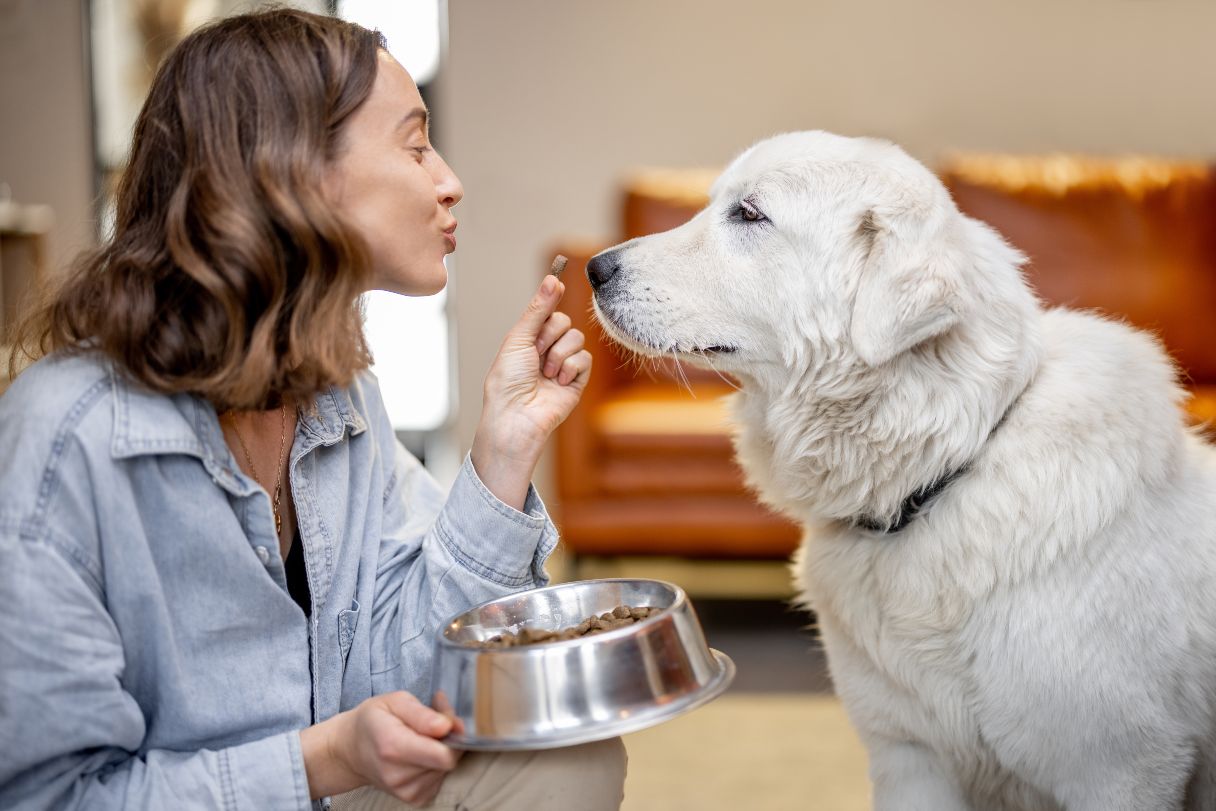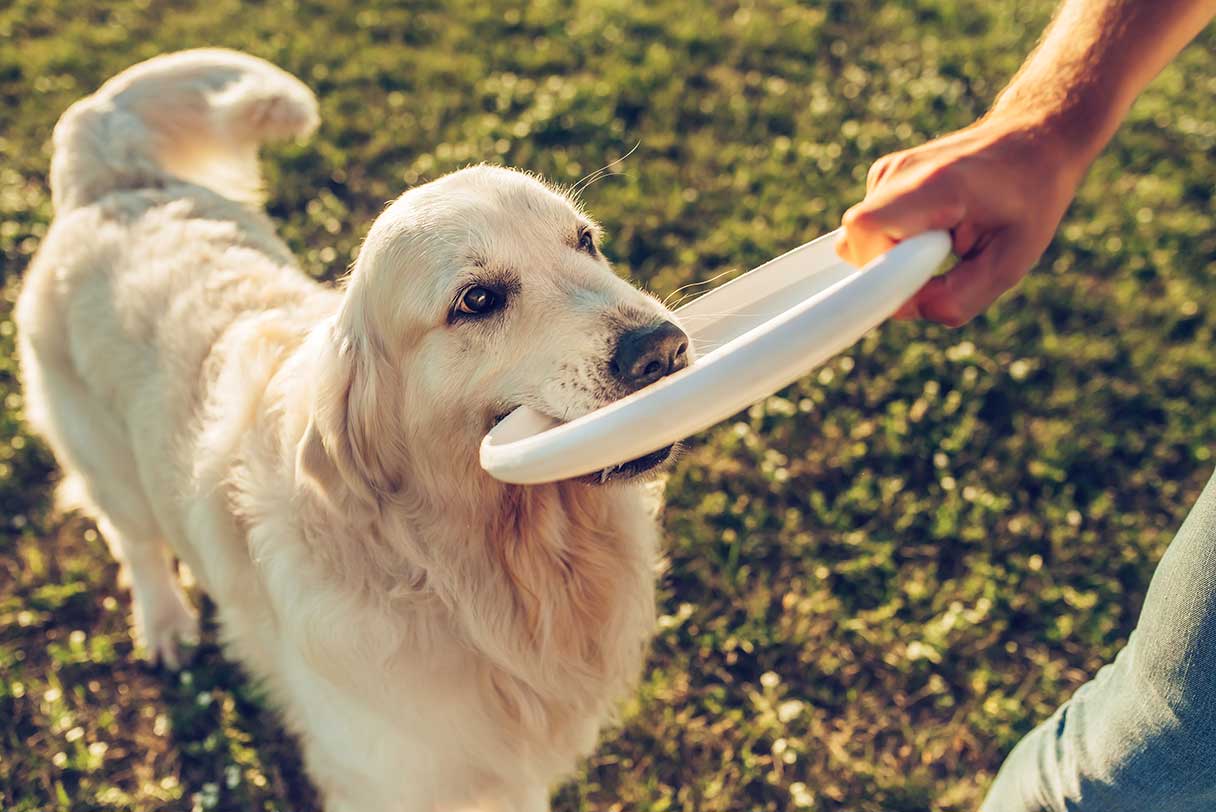You might think your dog’s gut operates in a straightforward way: Food goes in, nutrients are absorbed and poop comes out. But the gut does much more to support your dog’s health, from energy levels and mood to immune function and skin health.
A healthy gut with a balanced and diverse microbiome — the billions of bacteria and other microorganisms that live in your pup’s gut — supports a healthy dog. Here’s what you may want to know about your dog’s gastrointestinal (GI) tract, including what you can do to help boost their gut health.
Why Does Gut Health Matter?
Your dog’s gut plays a central role in their overall health. The term “gut” refers to the entire digestive tract, which includes the mouth, esophagus, stomach, small intestine and large intestine. Primarily concentrated in the large intestine is a diverse community of bacteria and other microbes that help break down food, absorb nutrients and fight invaders.
Microbial balance and gut health are closely linked. When one is disrupted, the other suffers. Poor digestion and an unhealthy gut environment can lead to a host of other health issues, including vitamin deficiencies, weight changes, low energy and skin problems.
The gut and brain are connected, so poor gut health in dogs can also lead to behavioral changes or disorders. Additionally, many of the body’s immune cells and tissues live in the gut. When gut health in dogs is poor, the immune cells can overreact to food particles and good bacteria, contributing to inflammation and immune-mediated diseases like allergies.
What Does a Healthy Gut Look Like?
When your dog’s gut functions well, you probably won’t notice it. Here are the hallmarks of a healthy gut in dogs.
- Appetite and energy. Dogs with a healthy gut have consistent energy levels and get excited about mealtimes, but don’t act like they are starving.
- Digestive consistency. Dogs have, on average, one to three bowel movements each day on a relatively regular schedule. Their feces should be easy to pick up without leaving residue on the grass and have a consistent brown color.
- Healthy appearance. Dogs that absorb nutrients properly can more easily maintain a healthy weight and show outward signs of general wellness, such as a shiny coat, minimal “doggie” odor, clean ears and bright eyes.
All dogs are different, and the signs of a healthy gut can vary based on age, breed, lifestyle and the presence of other health conditions. Learning what’s normal for your dog can help you identify signs of a problem in their gut.
Common Gut Health Issues in Dogs
Digestive health problems in dogs may often come with telltale signs. Talk to your veterinarian if you notice any of the following:
- Appetite changes
- Excessive gas
- Going more or less frequently than normal
- Gurgling stomach noises
- Loose or watery stools
- Straining to poop
- Vomiting
- Weight gain or loss
Many things may cause gut health issues in dogs, from a diet change to a serious medical condition. The most common medical conditions that can directly affect gut health include:
- Food allergies. Dogs can have an allergy to certain food ingredients, triggering an immune reaction that can cause inflammation in the gut or skin.
- Food sensitivities. Some dogs have trouble digesting certain ingredients, often those with sugars, fiber or fat their body isn’t used to.
- Infections and dysbiosis. An intestinal infection, injury or disease can allow “bad” bacteria to overgrow. Dysbiosis, an imbalance in a dog’s microbiome, can worsen other health conditions.
- Inflammatory bowel disease (IBD). IBD is a chronic disease that can cause inflammation anywhere in the gut, causing recurrent vomiting, diarrhea and sometimes weight loss.
- Liver or pancreatic disease. These organs aid in food digestion. When they don’t work well, digestive issues like chronic diarrhea and weight loss can result.
Other Factors Affecting Gut Health in Dogs
What you put into your dog’s body — including food, medications and supplements — affects what comes out. Genes, age, environment and lifestyle can also have a significant impact. Some breeds and individuals are more susceptible to GI diseases or gut health imbalances, but outside influences matter, too. Additional factors that can affect gut health include:
- Diet changes. Sudden diet changes or dietary indiscretion — when dogs eat something they find on the floor or in the trash — overwhelm the gut’s enzymes and microbes and often cause diarrhea.
- Medications. Antibiotics can upset the gut’s microbial balance. While they are often necessary, they can accidentally kill the good bacteria that protect the gut’s cells.
- Stress. Stress can target the gut, which is why dogs often develop diarrhea while boarding or traveling, or may drool and vomit from anxiety or phobias.
Feeding for a Healthy Gut
A balanced diet provides the gut with what it needs to break down nutrients, fuel beneficial bacteria and maintain smooth digestion. Dogs need protein, fat, carbohydrates, vitamins and minerals in the right proportions to optimize overall health, but fiber is particularly important for the gut.
Feeding good bacteria with prebiotics and probiotics
Fiber is not fully digestible by the body, but it feeds bacteria in the colon, or large intestine, that produce substances to keep the gut lining healthy. Fiber also helps regulate the amount of water in stools. Manipulating the balance of fiber in the diet is one way veterinarians may treat digestive issues.
Prebiotics and probiotics can be helpful additions to your dog’s diet. Prebiotics are fibers that feed specific bacteria in the gut, while probiotics introduce beneficial bacteria to help restore balance after illness, antibiotic use or stress. Prebiotics and probiotics can be added to your dog’s food or given in supplement form.
Choosing gut-friendly dog food
Commercial pet food — dry, canned, fresh or frozen — works well for most dogs, as long as you find the right formula for your pet’s needs. Choose a food that is labeled complete and balanced by the American Association of Feed Control Officials (AAFCO). If the food doesn’t agree with your dog, try one with a different protein source or fiber content, taking care to make the change slowly over seven to 10 days.
Veterinarians may recommend against home-prepared diets, except for short-term use or for dogs with multiple health conditions. If your veterinarian has recommended a home-cooked diet for your dog, you should consult with a veterinary nutritionist to avoid harmful dietary imbalances.
Supplements vs. treatments for digestive support
When your dog’s gut needs a little extra help, supplements can be a valuable part of their care plan. But not every dog needs them, and not all products work the same way. Some popular options include:
- Digestive enzymes to help break down food more easily
- Herbs and natural remedies — such as clay, slippery elm or marshmallow root — that soothe the gut lining
- Probiotics to add good bacteria and crowd out harmful bacteria
Supplements can help support and maintain gut health, but they usually aren’t enough to treat serious health problems. Consult your veterinarian if you’re dealing with ongoing digestive issues, as your pup might need a prescription medication or diet to get their condition under control.
Tips for Maintaining Gut Health in Dogs
These simple steps can help you maintain your dog’s gut balance and resilience over time:
- Address new gut health issues promptly with your veterinarian
- Choose complete and balanced dog food that is appropriate for your dog’s life stage
- Encourage routine exercise and good hydration to keep your dog regular
- Follow veterinary recommendations for parasite control and prevention
- Make diet changes slowly over seven to 10 days
- Minimize emotional and physical stress
- Schedule routine veterinary visits, including fecal parasite screenings
- Use prebiotics and probiotics to boost gut health in dogs
When to See Your Veterinarian
Not every soft stool or skipped meal is cause for alarm. However, you should call your vet if you aren’t sure about your pet’s condition or if you notice any of the following:
- A bloated or painful abdomen
- Blood or mucus in the stool
- Diarrhea or vomiting that lasts more than 24 hours or keeps coming back
- Lethargy or appetite changes
- Weight changes
Your veterinarian can rule out or diagnose serious health problems, suggest a temporary or long-term diet change and provide prescription medications or trusted supplement recommendations to address the underlying issue.
Follow Your Gut
Your dog’s gut health can impact their overall well-being, from digestion and weight to energy, mood and disease prevention. The right dog food, supplements and veterinary care — combined with an understanding of how the gut works — can help you keep your dog’s digestive system in balance. When in doubt about canine gut health, contact your veterinarian to discuss how to optimize your dog’s health.
Frequently Asked Questions About Gut Health in Dogs
Here are quick answers to some of the most common questions dog parents ask about gut health.
CareCredit Credit Card Financing for Dogs
The CareCredit credit card provides a convenient way to pay for your dog’s vaccinations and other health and wellness expenses, including exams, medications and products at providers in the CareCredit network.* Continue your wellness journey by downloading the CareCredit Mobile App. You can find a provider on the go, manage your CareCredit account and easily access the Well U blog for more great articles, podcasts and videos. Use our Acceptance Locator to find a veterinarian that accepts CareCredit to help keep your pet healthy and happy for a lifetime of love.
In addition to pet care, you can also use your CareCredit credit card for dentistry, cosmetic, vision, hearing, health systems, dermatology, pharmacy purchases, spa treatments and so much more within the CareCredit network. How will you invest in your health and wellness next?
Author Bio
Angela Beal, D.V.M., has more than 20 years of experience as a veterinarian. Leveraging her background in private practice and academia, she uses her passion for writing to convey information to pet owners to help them keep their pets healthy and happy.








